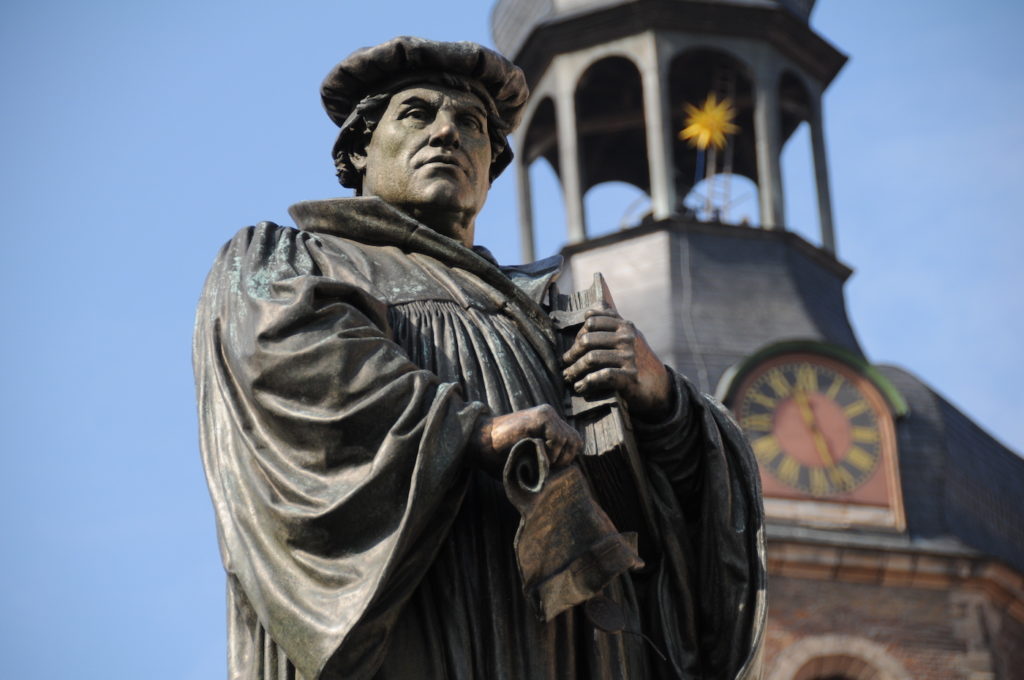This essay is part of a week-long series drawn from the Witherspoon Institute’s project on Natural Law, Natural Rights, and American Constitutionalism. Click here to read PD Editor-in-Chief R.J. Snell’s introduction to the series.
In notable contrast to the splintered nature of Protestantism and the countless theological fads found within her borders, contemporary Protestants who otherwise have very little in common nevertheless share common ground in their opposition to natural-law thinking. This opposition, moreover, is not limited to revisionist thinkers; it characterizes those who are confessionally orthodox as well.[1] Across Protestantism one can find a broader consensus that rejects the natural law as a metaphysical notion of moral reality, namely, a law that God communicates to all without the need for special revelation (such as the Bible), and that therefore applies to all people at all times and in all places.[2] For this reason, one is hard-pressed to identify a single major figure in Protestant theological ethics who has developed and defended a theory of natural law.[3]
However deeply entrenched the natural law’s neglect or opposition is among today’s Protestants, it cannot be attributed to the magisterial Reformers of the sixteenth century.[4] Although it is decidedly true that they championed a particular understanding of grace and faith that took issue with their Roman Catholic counterparts, this was not to the exclusion of other vehicles of divine agency.[5] Rather, they assumed the natural law as a part of the fabric of the created order and therein maintained continuity with those across the Reformation divide. It is accurate to insist that in their nature the Reformation controversies were foremost theological and ecclesiastical, not ethical.[6]
Martin Luther
Start your day with Public Discourse
Sign up and get our daily essays sent straight to your inbox.Notwithstanding Luther’s outbursts against Aristotelian philosophy,[7] natural-law assumptions are firmly ensconced in Luther’s thought. In his 1525 treatise How Christians Should Regard Moses, the reformer distinguishes between the Law of Moses, with its historically conditioned components and stipulations for theocratic Israel, and the natural law.[8] “If the Ten Commandments are to be regarded as Moses’ law, then Moses came too late,” Luther can wryly quip, since “Moses agrees exactly with nature” and “what Moses commands is nothing new.” Moreover, Moses “also addressed himself to far too few people, because the Ten Commandments had spread over the whole world not only before Moses but even before Abraham and all the patriarchs. For even if a Moses had never appeared and Abraham had never been born, the Ten Commandments would have had to rule in all men from the very beginning, as they indeed did and still do.”[9] “Where . . . the Mosaic law and the natural law are one, there the law remains and is not abrogated externally.”[10] By contrast, those aspects of the Mosaic code that were temporal and confined to theocratic Israel are said to be “null and void” and “not supported by the natural law.”[11]
Luther further deliberates in his treatise Temporal Authority over particular situations in the public square that involve Christians and non-Christians—among these, the unlawful seizure of private property and the settling of financial debts. He exhorts his readers to use both “the law of love” and “the natural law.” However, where the former has no observable effect, the latter is to be our guide, since it is that “with which all reason is filled” and the very “spring of justice.”[12]
Luther’s position is unambiguous: the moral norms that apply to all people, Christians and non-Christians, are the same; there are not two different ethical standards within the realm of divine law. Luther adopts the basic understanding of natural law that had been set forth by fellow reformer Philip Melanchthon in the latter’s commentary on Rom. 2:15: the natural law is “a common judgment to which all men alike assent, and therefore one which God has inscribed upon the soul of each man.”[13] Everyone, observes Luther, must acknowledge that what the natural law dictates in the human heart is right and true. There is no one, he insists, who does not sense the effects of the natural law, since nature and “the law written on the heart” (Rom. 2:14-15) attest to it.[14] For Luther, the natural law was presumed to be operative within all people and thus lodged at the core of Christian social ethics. Were this not the case, “one would have to teach and practice the law for a long time before it became the concern of conscience,” without which it would not become a matter of conscience for anyone.[15]
Philip Melanchthon
In 1518 a young and remarkably gifted linguist received a call from the Elector of Saxony to fill a newly created professorship of Greek at the University of Wittenberg.[16] Luther appears to have been moved by Philip Melanchthon’s inaugural lecture at Wittenberg. Though far more “ecumenical” and “humanistic” than Luther—he had studied classical literature at the University of Tübingen—Melanchthon nevertheless shared the Lutheran burden to counter Pelagian tendencies in the Church. Because of sin, human beings do not possess the capacity to know God through reason unaided. For this reason, justification is to be understood in Pauline terms, namely, by faith alone—which is to say, a forensic imputation via divine grace—and not to be confused with sanctification, which is a life-long process.
It is difficult to over-emphasize Melanchthon’s role in debates between the Lutheran reformers and the Catholic Church from 1520 onward. This can be seen in the fact that he drafted or helped draft three significant documents: the Augsburg Confession (1530), the Apology of the Augsburg Confession (1531), and the Smalkald Articles (1537). With Luther, Melanchthon distinguished between law and gospel and thus the role of faith in theological justification.[17] At the same time, he contended, law was necessary to restrain the wickedness of the human heart and maintain civil-political order. Moreover, because justice and the moral order remain constant, Christian believers can be involved in the high calling of political activity, contrary to the view of the “radical” reformers. To do this, moral law is requisite.
For Melanchthon, the laws of nature that, for example, govern astronomy and the cosmos point to the natural law insofar as “law” corresponds with regularity and normativity.[18] Regularity in nature, coupled with various species of intuitive knowing (for example, experience, reasoning and revelation), informs moral philosophy.[19] For the magisterial reformers, this link is important inter alia because of the Protestant focus on providence and because the claims of the “radical” reformers were viewed as undermining the social and political order.[20] Consistent with Luther and Calvin, Melanchthon stresses a threefold manner in which law functions: it is paedagogical in that it teaches us of the divine character; it is theological insofar as it brings people to faith by revealing their fallenness; and it is political in its usage to the extent that it restrains human inclinations and maintains a civil order.[21] The significance of the three “uses” of law is that it occupies a middle ground between Roman Catholic legalism and radical Anabaptist antinomianism in the sixteen century. That is, if law is not per se salvific, what is its significance and what are its functions?[22]
In Articles 5 through 8 and 14 of his Loci Communes, Melanchthon acknowledges that even though keeping the Ten Commandments does not merit justification, the unbelieving person nevertheless must abide by them because as an expression of the natural law they mirror divine law. And although no person can keep them perfectly, the “natural light” of reason informs every human being that compliance is demanded in human social life. Reason and revelation, for Melanchthon, co-exist, and neither is threatened or undermined by the other.[23]
Two broader loci or focal points weave their way throughout Melanchthon’s theological system and, by his own concession, they occupy Melanchthon his entire career. One is the nature of righteousness or justification, and how this justification is known. The other, though much broader, concerns the nature of human traditions and how to understand them.[24] For this reason, law occupies a central place in Melanchthon’s thinking,[25] prompting one German philosopher to label him “the ethicist of the Reformation.”[26] For both Luther and Melanchthon, God’s “hidden” presence in earthly kingdoms (i.e., the Lutheran “two-kingdom” theory) suggests that while order, law, and justice are not salvific, they are part of the order of creation and maintained by God, hence the importance of the natural law.
John Calvin
Given the emphasis on divine sovereignty and human depravity in Calvin’s theological system, one might assume that the reformer had a dim view of the natural law. This, however, is not the case.[27] Notwithstanding the ravages of sin, Calvin is keenly aware of St. Paul’s argument in Romans that the Gentiles “show the work of the law written on their hearts” (Rom. 2:14). Calvin’s uses of the law—ceremonial, judicial, and moral—presuppose his conviction that there are aspects of human law that are both binding and non-binding.[28]
Calvin affirms the Thomist-Aristotelian assumption that “by nature man is a social animal.” Because of this anthropological reality, man is disposed “from natural instinct, to preserve society,” the result of which is that “human societies must be regulated by law,” without which there would be no civil order.[29] The seeds of these laws, insists Calvin, are “implanted in the breasts of all without a lawgiver” and unaffected by the vicissitudes of life; neither war nor catastrophe nor theft nor human disagreement can alter these moral intuitions, since nothing can eliminate “the primary idea of justice” within.[30]
Of the general themes that form the heart of Calvin’s theology, divine majesty and divine sovereignty—by which the world is ordered—feature prominently in Calvin’s thinking. The divine law expresses itself in the natural law, and hence, is construed to be an extension of divine providence. It is a “providential bridle”[31] that demonstrates the indivisible link between cosmic and moral orders, and human conscience, by nature, is able to discern this connection.
Because man is a social animal, he is disposed, by nature, toward the preservation of society. Calvin observes that “the minds of all have impressions of civil order” and that “every individual understands how human societies must be regulated by law.”[32] “We certainly cannot say that they [the Gentiles] are altogether blind as to the rule of life,” he insists, for nothing is more common than for humans “to be sufficiently instructed in right conduct by natural law.”[33]
How corrupt is the human heart, in Calvin’s view? Thoroughly. And there is no realm of human experience that has gone untouched by the common human condition of sin. But to acknowledge the pervasiveness of human depravity, for Calvin, is not to obliterate the rudimentary moral sense in each person.[34] Rather, “conscience” is an awareness in humans beings of moral accountability which “does not let them hide their sins but arraigns them as guilty,” since it “does not allow man to suppress within himself what he knows, but pursues him to the point of making him acknowledge his guilt.”[35]
The natural law, for Calvin, constitutes an important aspect of knowing “the rule for the conduct of life.” On this point he is insistent: if Gentiles by nature have “law righteousness” engraved upon their minds, we surely cannot say that they are utterly blind as to the conduct of life; otherwise, they could not be deemed “without excuse” (cf. Rom. 1:20).[36] Notwithstanding the emphasis in his teachings on human depravity, Calvin cannot be interpreted as saying that humans are incapable of basic moral reasoning. Rather, he sides with St. Paul: “natural law is that apprehension of the conscience which distinguishes sufficiently between just and unjust, and which deprives men of the excuse of ignorance while it proves them guilty by their own testimony.”[37] The reformer acknowledges that despite “man’s perverted and degenerate nature,” the image of God is not “totally annihilated and destroyed”; to the contrary, “some sparks still shine” in human creation.[38]
Huldreich Zwingli
The threefold use of the law, for which the Protestant reformers are well known, finds supplemental use—belonging to the judicial realm—in the Swiss Reformational emphasis on covenant. The use of the biblical concept of covenant as a sociopolitical idea emerges particularly in the writings and work of the Swiss Reformers. Covenant not only provides a theological basis for understanding divine work in history, but conjoined to the natural law it furnishes the basis for communal, civil and moral obligations that are thought binding on all human beings and all societies.[39]
In the political theology of Zwingli,[40] a Swiss priest who began preaching the Reformation in 1519, covenant and natural law function together as a buttress against tyranny and as a safeguard of citizens’ natural rights. In Zwinglian thought, the natural law serves as a bulwark and primary means by which to resist injustice and political oppression. With even greater emphasis than that of Luther, Zwingli understands “the law of nature”—that which is “implanted by God on the heart of man and confirmed by the grace of God through Christ”—to be the basis for all human laws.[41] Mirroring the distinctive features of the Swiss Reformation, Zwingli believes that due to the imperfection of reason, only those rulers and magistrates who are God-fearers properly know the natural law.[42] This appears to be an outgrowth of his thoroughgoing biblicism and the fact that, for him, natural law tends to become assimilated into divine law whereby the Lutheran distinction between law and gospel recedes.[43] Zwingli’s goal was not a Christian society per se; rather, he believed that God had ordained through the state—and a Christian magistrate—the best possible order in which citizens might flourish. This type of order is enhanced through the concept of covenant, which is on display both in Israel of the Old Covenant and the church in the New.[44]
Law, as the Swiss reformers understood it, has two primary functions: it echoes grace insofar as it is a gift from the Creator; and it has a civil-political use in that the civil authorities protect the moral-social order by punishing evildoers and rewarding those who do good. Natural law, thus, expresses both divine and human justice. Because of the depravity of the human heart, Zwingli reasons, humans are incapable of acting justly and hence need the “restraining” influence that comes from the law divinely imprinted on the human heart – an imprint that gives all people a basic knowledge of good and evil. Without this restraining influence, society would descend into anarchy.[45] The natural law and covenant combine to serve as a necessary safeguard against such disorder.
Scholarship across virtually all disciplines has for the most part been inattentive to the impact of 16th-century Protestant thinking as it influenced the development of Western legal institutions.[46] Although Protestant belief, due to its accent on faith, grace, and unmerited favor, understood itself as a return to biblical foundations, it is correct to insist that the Protestant affirmation of the natural law was in continuity with Roman Catholic moral theology and the historic Christian tradition.














